| Srl | Item |
| 1 |
ID:
082540
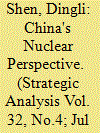

|
|
|
|
|
| Publication |
2008.
|
| Summary/Abstract |
This article offers a Chinese perspective on reducing the threat of nuclear weapons due to nuclear weapons proliferation and its deterrent gestures, long employed since the Cold War. It is pointed out that nuclear weapons are increasingly irrelevant to nuclear weapons states. However, some non-nuclear weapons states may view this differently. Nuclear abolition has presented a visionary opportunity for all sides to relinquish those weapons increasingly unnecessary for nuclear weapons states. Before such an idealistic world is attained, efforts of nuclear non-proliferation are indispensable along with a process of nuclear disarmament.
*This article is written for this issue of Strategic Analysis only, as part of the Project of 'A Sino-US Joint Study of Non-Traditional Security' at the Center for American Studies, Fudan University (State Innovative Research Base of Philosophy and Social Science
|
|
|
|
|
|
|
|
|
|
|
|
|
|
|
|
| 2 |
ID:
082539
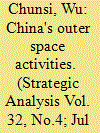

|
|
|
|
|
| Publication |
2008.
|
| Summary/Abstract |
One important feature of China's outer space policy is to carry out cooperation with all countries. In the cooperation, China pays great attention to the rights and demands of developing countries in the high-technology area. With more actors in outer space, it is necessary and urgent to improve the existing legal system regulating the relations of countries and non-state actors. China's attitude to outer space activities is driven by both domestic and international elements. Development, defence, and technological innovation are the three major goals of China's outer space programmes
|
|
|
|
|
|
|
|
|
|
|
|
|
|
|
|
| 3 |
ID:
082538
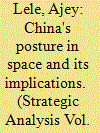

|
|
|
|
|
| Publication |
2008.
|
| Summary/Abstract |
As part of its peaceful rise strategy, China has made resolute investments in the field of science and technology. One major aspect of this technological quest has been its investments in space technologies. China's success in this field is remarkable and has brought glory to the nation. However, at the same time, the anti-satellite test (ASAT) undertaken by China, during January 2007, has raised the fears of the weaponization of space. This article examines the developments in China's space programme and attempts to analyse its impact on the global space architecture in general and on India in particular.
|
|
|
|
|
|
|
|
|
|
|
|
|
|
|
|
| 4 |
ID:
082534


|
|
|
| 5 |
ID:
082541
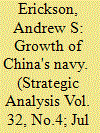

|
|
|
|
|
| Publication |
2008.
|
| Summary/Abstract |
The PLA Navy (PLAN)'s capabilities in key areas (assets, trained personnel, experience) are currently insufficient to support long-range sea lanes of communication (SLOC) defense missions. With sufficient effort, Beijing may eventually overcome these obstacles, but it would probably also have to acquire some form of overseas basing access, which its foreign policy still proscribes. As it works to bridge this gap, China will use 'soft power' diplomacy, trade, humanitarian assistance, and arms sales to increase its influence in the region, thereby preserving the possibility of cooperation with major regional and international actors.
*The views expressed in this article are those of the author alone. They do not represent the estimates or policies of the US Navy or any other element of the US Government. The author is indebted to William Murray for his meticulous reviews of several earlier versions.
|
|
|
|
|
|
|
|
|
|
|
|
|
|
|
|
| 6 |
ID:
082537
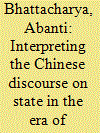

|
|
|
|
|
| Publication |
2008.
|
| Summary/Abstract |
Under the impact of globalization the Chinese state is caught in the dilemma of intensifying economic reforms on the one hand, and maintaining authoritarian rule on the other. This dichotomy has put China at the crossroads and precipitated a debate between its Left and the Right groups on the direction the Chinese state should take. Hu Jintao sought to address this dilemma by formulating the concept of harmonious development. However, there are doubts on how an authoritarian China will reconcile with the two opposing forces of globalization and authoritarianism and thereby achieve a truly harmonious society
|
|
|
|
|
|
|
|
|
|
|
|
|
|
|
|
| 7 |
ID:
082536


|
|
|
|
|
| Publication |
2008.
|
| Summary/Abstract |
In recent years, China has again publicly revived its territorial claims over India's northeastern state of Arunachal Pradesh. However, by insisting on these claims, China is making a settlement of the territorial issue virtually impossible and seriously misperceiving public opinion trends in India. China has failed to appreciate that if Arunachal is claimed to be the southern part of Tibet Autonomous Region (TAR), India cannot accept Tibet to be within China. India's formal position on Tibet articulated in 1954 and 2003 is therefore a tentative and unilateral diplomatic offer that can only be sustained and the circle completed once China recognizes Arunachal as part of India.
|
|
|
|
|
|
|
|
|
|
|
|
|
|
|
|
| 8 |
ID:
082535


|
|
|
|
|
| Publication |
2008.
|
| Summary/Abstract |
The SCO- a linchpin of China's Eurasia policy is viewed ominously by most international watchers. China is nurturing the SCO as an exclusive nucleus to undercut the US strategic outreach. But, Central Asia, the main nucleus, suffers from strategic ambiguity and the states there seek varied goals and play major power off each other. There is also an ostensible mismatch between Russia's liberal and China's expansionist approach. Will the SCO emerge as a distinct pole or will it remain an opportunistic alliance of desperate states? This paper argues that despite all the rhetoric, the organization will suffer from multiple limitations
|
|
|
|
|
|
|
|
|
|
|
|
|
|
|
|